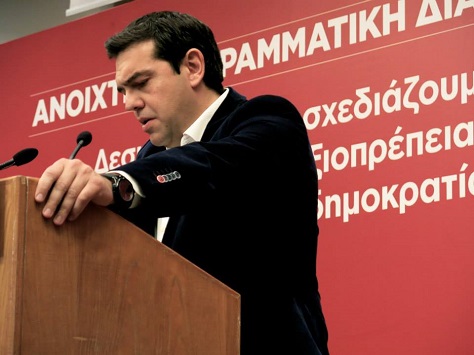It’s understandable why German chancellor Angela Merkel doesn’t want to cut any deals with Greece — no matter who wins the snap elections later this month.![]()
![]()
Making concessions, especially to a far-left, anti-austerity figure like potential prime minister Alexis Tspiras, could embolden every recession-weary country from Portugal to Romania to demand relief from Brussels and Berlin, and it could give substantive figures on the European left, including Italian prime minister Matteo Renzi, French president François Hollande and even German social democrats in Merkel’s own grand coalition, a platform to doubt the Berlin-dominated approach to fiscal policy throughout the eurozone.
According to Merkel (pictured above, right, with incumbent Greek prime minister Antonis Samaras) and much of the German electorate, the troika of the European Commission, the European Central Bank and the International Monetary Fund has already been too soft on Greece, lowering the interest on over €240 million in bailout funds and extending the repayment schedule.
* * * * *
RELATED: What to expect from Greece’s January 25 snap elections
* * * * *
Nevertheless, it’s incredible that Merkel and her aides take such a cavalier attitude to a potential Greek eurozone exit, which they apparently haven’t ruled out in the event that Tsipras’s leftist SYRIZA (the Coalition of the Radical Left — Συνασπισμός Ριζοσπαστικής Αριστεράς) wins national elections in 18 days. Three years after ECB president Mario Draghi promised to do ‘whatever it takes’ to save the eurozone, Merkel now believes that Greece is expendable, that the eurozone is no longer subject to the domino theory that would make a ‘Grexit’ calamitous and that the eurozone is now governed by a chain theory that suggests a Greece-less eurozone will be rid of its weakest link.
It may be smart domestic politics in Germany, where the anti-euro Alternative für Deutschland (Alternative for Germany) is gaining support on Merkel’s right flank in both state and federal politics, but it’s an incredibly tin-eared intrusion three weeks before Greeks vote. It certainly won’t help the beleaguered coalition government of center-right, pro-bailout prime minister Antonis Samaras, whose New Democracy (Νέα Δημοκρατία) narrowly trails SYRIZA in most polls. Greeks already realize that a vote for Tsipras (pictured above) brings with it greater uncertainty, so Samaras has some hope that the electorate will have doubts about handing power to SYRIZA. He certainly doesn’t need Merkel to make that point for him. Continue reading Merkel’s incredibly stupid New Year Grexit bluff





